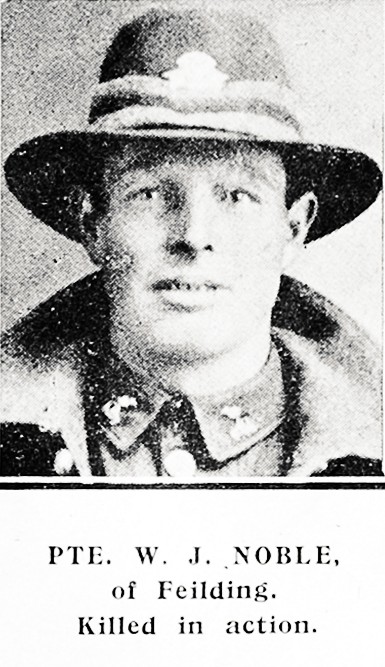Pte
William John Noble
Informationen zu Geburt
|
Geburtsdatum: 03/02/1882 |
|
Geburtsort: Feilding, Manawatu, New Zealand |
Allgemeine Informationen
|
Beruf: Taglöhner |
Informationen zum Armeedienst
|
Land: New Zealand |
|
Truppe: New Zealand Expeditionary Force |
|
Rang: Private |
|
Dienstnummer: 34124 |
|
Einberufung datum: 18/09/1916 |
|
Einberufung ort: Trentham, Wellington, New Zealand |
|
Einheiten: — Canterbury Regiment, 3rd Bn. |
Informationen zu Tod
|
Sterbedatum: 22/11/1917 |
|
Sterbeort: Polygon Wood, Zonnebeke, Belgien |
|
Todesursache: Im Kampf gefallen |
|
Alter: 35 |
Begräbnisplatz
|
Buttes New British Cemetery, Polygon Wood Grabstelle: I Reihe: A Grab: 10 |
Auszeichnungen und Orden 2
|
British War Medal Medaille |
|
Victory Medal Medaille |
Punkte von Interesse 3
| #1 | Geburtsort | ||
| #2 | Einberufung ort | ||
| #3 | Ort des Todes (ungefähr) |
Meine Geschichte
William Noble was born on 3 February 1882, youngest child of John and Emily Noble who came as immigrants to the Manawatu area of New Zealand in 1874. The couple had eight children; six born in New Zealand. He was registered as William Edward Noble at birth but seems to have adopted his father’s name as his second christian name.
William was a farm labourer for Robert Levin in the Rangitikei district of Manawatu when he enlisted into the 21st Reinforcement on 18 September 1916 at Trentham Camp. He trained at Trentham and Featherston camps. He was briefly in Featherston Military Hospital with influenza in November 1916.
William’s part of the 21st Reinforcement embarked on 19 January 1917 from Wellington on the troop ship Waitemata, arriving in Plymouth on 27 March. He immediately resumed training at Sling Camp, England. On 2 May he was posted to the 3rd Battalion, Canterbury Infantry Regiment which was part of the 4th NZ Infantry Brigade, now training at Codford Camp.
With the 4th Brigade he sailed to France on 28 May 1917. By September the New Zealand Division was preparing to fight at the battles of Broodseinde and Passchendaele. His battalion was part of 4th NZ Brigade and took part on the attack on Gravenstafel on 4 October. It is not known if William was personally involved.
The New Zealand Division was in the Polygon Wood area after the end of the Third Battle of Ypres. Much of the time was spent in wiring, repairing crumbling trenches and improving defences. The landscape was covered with waterlogged shellholes.
Neither the New Zealand Division history or that of the Canterbury Regiment give detailed information for the December 1917-February 1918 period so it is impossible to say with any certainty how William Noble died on 22 November 1917. On the night of 21/22 November, 3rd Canterbury Battalion relieved the 3rd Auckland Battalion at a position called Joiners Rest, at Polygon Wood and it can be presumed he was killed during this event. The opposing German forces generally held higher ground and movement in the New Zealand lines was often observed and shelled or machine-gunned.
His body was recovered and buried. He is now in Buttes New British Cemetery in Polygon Wood, Plot I, Row A, Grave 10.
William was a farm labourer for Robert Levin in the Rangitikei district of Manawatu when he enlisted into the 21st Reinforcement on 18 September 1916 at Trentham Camp. He trained at Trentham and Featherston camps. He was briefly in Featherston Military Hospital with influenza in November 1916.
William’s part of the 21st Reinforcement embarked on 19 January 1917 from Wellington on the troop ship Waitemata, arriving in Plymouth on 27 March. He immediately resumed training at Sling Camp, England. On 2 May he was posted to the 3rd Battalion, Canterbury Infantry Regiment which was part of the 4th NZ Infantry Brigade, now training at Codford Camp.
With the 4th Brigade he sailed to France on 28 May 1917. By September the New Zealand Division was preparing to fight at the battles of Broodseinde and Passchendaele. His battalion was part of 4th NZ Brigade and took part on the attack on Gravenstafel on 4 October. It is not known if William was personally involved.
The New Zealand Division was in the Polygon Wood area after the end of the Third Battle of Ypres. Much of the time was spent in wiring, repairing crumbling trenches and improving defences. The landscape was covered with waterlogged shellholes.
Neither the New Zealand Division history or that of the Canterbury Regiment give detailed information for the December 1917-February 1918 period so it is impossible to say with any certainty how William Noble died on 22 November 1917. On the night of 21/22 November, 3rd Canterbury Battalion relieved the 3rd Auckland Battalion at a position called Joiners Rest, at Polygon Wood and it can be presumed he was killed during this event. The opposing German forces generally held higher ground and movement in the New Zealand lines was often observed and shelled or machine-gunned.
His body was recovered and buried. He is now in Buttes New British Cemetery in Polygon Wood, Plot I, Row A, Grave 10.
Quellen 3
|
Auckland Weekly News http://www.aucklandcity.govt.nz/dbtw-wpd/heritageimages/ Verwendete Quellen |
|
Births deaths marriages New Zealand https://www.bdmhistoricalrecords.dia.govt.nz/ Verwendete Quellen |
|
Ferguson David, The history of the Canterbury Regiment, NZEF 1914-1919, (Auckland, Whitcombe & Tombs Ltd, 1921), pg. 204-208. Verwendete Quellen |
Weitere Informationen 5
|
Commonwealth War Graves Commission Database https://www.cwgc.org/find-records/find-war-dead/casualty-details/480383 |
|
Namenlijst (In Flanders Fields Museum) https://namenlijst.org/publicsearch/#/person/_id=30745ba4-71c7-40b2-9bb2-06449cc9b551 |
|
Lives of the First World War (Imperial War Museum) https://livesofthefirstworldwar.iwm.org.uk/lifestory/7180643 |
|
The NZEF Project (UNSW Canberra) https://nzef.adfa.edu.au/showPerson?pid=190795 |
|
Online Cenotaph (Auckland Museum) https://www.aucklandmuseum.com/war-memorial/online-cenotaph/record/c11530 |
